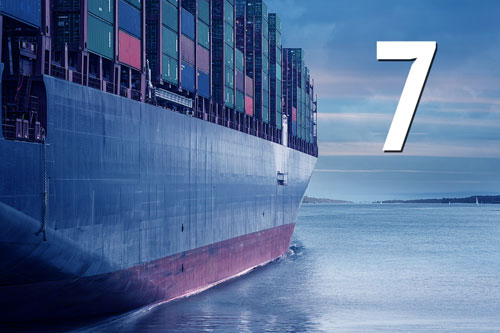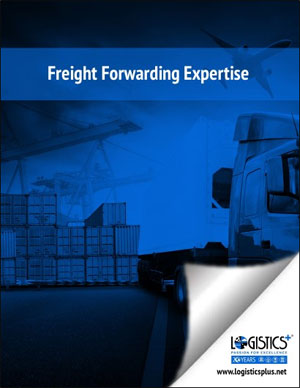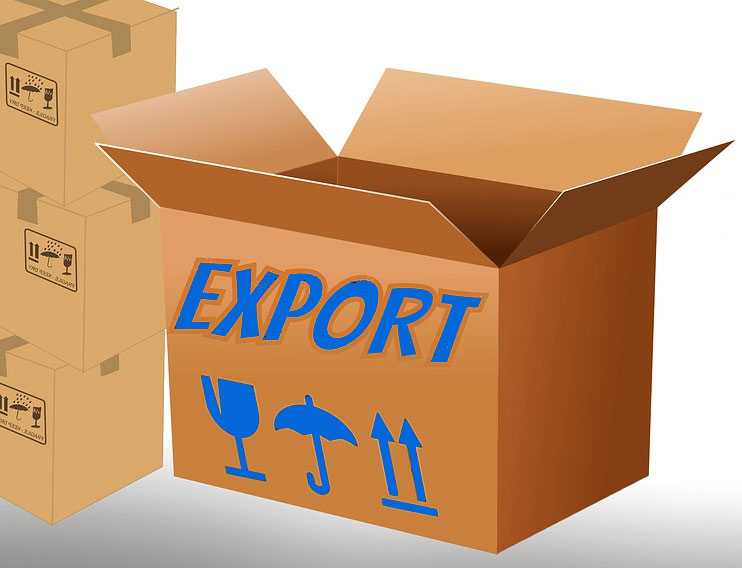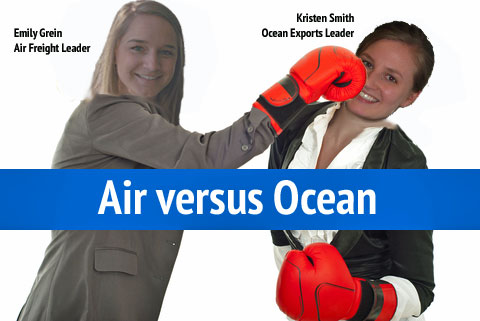
by logisticsplus | Nov 15, 2016 | News
 Here are a few quick, cost-saving tips for importing and exporting from the international air, international ocean, and project cargo freight forwarding experts at Logistics Plus:
Here are a few quick, cost-saving tips for importing and exporting from the international air, international ocean, and project cargo freight forwarding experts at Logistics Plus:
Importing Tips:
- Take the time to confirm your HTS codes before importing. U.S. Customs’ system of classification can be very complicated, and the HTS codes advised by suppliers are not always accurate or match the U.S. classification system 100%. A full cost for imported goods can only be known with the correct HTS codes.
- Keep potential exams in mind when thinking about the transit time, for ocean shipments particularly. An exam can take a week or more, and could be caused by any importer on an LCL consolidation, or a container could be simply selected at random. If goods are time-sensitive, air shipping part or all of the order could save money in the long run.
- Be sure your broker or import forwarder is made aware of all ocean imports well in advance of departure from overseas. An Importer Security Filing (ISF) must be filed timely! Liquidated damages for ISF start at $5,000 for failure to file an ISF, $5,000 for late ISF, $5,000 for inaccurate ISF, $5,000 for an incomplete ISF, and $5,000 for failure to withdraw an ISF. The maximum liquidated damages per ISF filing is $10,000.
Exporting Tips:
- Know your Incoterms®. Incoterms can be a frustrating and confusing to understand; however many exporters do not fully understand the terms to which they are agreeing and, therefore, end up paying more or running into unexpected fees. As an exporter, you need to understand the costs, responsibilities, rights, and obligations that accompany the use of a specific Incoterm. Every quotation or sales order must include a term of sale. If you fail to clearly identify the specific Incoterm to your customer, it can lead to an overestimation or underestimation of the costs associated with the goods you are selling (and a lost sale).
- Research the area to which you are selling. Selling to a new area requires you to keep an open mind. Knowing the market you will be putting your product into can alleviate a lot of the stress with exporting. What currency do they use? What is the local tax or VAT (value-added tax) system? What is the business culture, and/or local culture? When are their holidays or weekends observed?
- Do your paperwork. Know that each country has its own set of importing regulations that require different licenses and customs paperwork. Some countries will require certain stamping, legalizations, or original documents, while others simply accept copies. These vary from country to country, region to region, and with specific commodities.
Most Important Tip:
- Work with an experienced and reputable freight forwarder. An international freight forwarder acts as an agent on your behalf and assists in moving your shipment from its U.S. origin to its foreign destination. Capable freight forwarders are familiar with the import rules and regulations of foreign countries, U.S. import and export regulations, methods of shipping, and required documentation. They can assist you in preparing pricing quotations by providing freight costs, port charges, documentation fees, insurance costs, and handling fees. They can also recommend packaging methods and transportation modes that will best protect your products during transport and ensure they arrive when and where you need them.
Ready to take us up on tip #7? If yes, then click the button below to get started.


by logisticsplus | Jul 6, 2016 | News
 A freight forwarder, forwarder, or forwarding agent is a person or company that organizes shipments for individuals or corporations to get goods from the manufacturer or producer to a market, customer or final point of distribution. When it comes to international freight forwarding, selecting the right global freight forwarder can help your business succeed by offering relief to many of your supply chain challenges – and possibly even providing you with a competitive advantage. Your freight forwarder should be an experienced and trusted partner for your logistics needs. Increasing levels of global sourcing and omnichannel retailing have created significant opportunities for importers and exporters around the world to optimize their supply chains. Whether you’re with a large, multinational corporation, or a small company shipping globally for the first time, selecting the right global freight forwarding partner can help you save time and money, increase shipment speed and visibility, and reduce your risk.
A freight forwarder, forwarder, or forwarding agent is a person or company that organizes shipments for individuals or corporations to get goods from the manufacturer or producer to a market, customer or final point of distribution. When it comes to international freight forwarding, selecting the right global freight forwarder can help your business succeed by offering relief to many of your supply chain challenges – and possibly even providing you with a competitive advantage. Your freight forwarder should be an experienced and trusted partner for your logistics needs. Increasing levels of global sourcing and omnichannel retailing have created significant opportunities for importers and exporters around the world to optimize their supply chains. Whether you’re with a large, multinational corporation, or a small company shipping globally for the first time, selecting the right global freight forwarding partner can help you save time and money, increase shipment speed and visibility, and reduce your risk.
Here are six (6) questions to ask when choosing a global freight forwarder:
- Can they provide capacity options across multiple shipping modes? They should be able to ship goods by ocean, air, rail or ground, choosing the best option for your need. They should also be able to consult you on consolidation and routing optimization options.
- Do they offer customs brokerage and trade compliance advice? They should be able to leverage customs information and programs to your advantage. They must be knowledgeable in free trade agreements and know how to navigate each country’s compliance requirements, customs rules, governmental regulations, and duty rates.
- Do they have regional offices in key geographic regions? Your global freight forwarder should have deep knowledge of the local countries in which you are importing or exporting. They should be familiar with local languages, infrastructure, economy, currencies, tax laws, and tariffs. They should also be members of reputable freight forwarding networks, such as WCA, IFLN, or TWIG. If a freight forwarder is a member of a reputable network, the chances of them handling your shipment with care and diligence anywhere in the world is higher than if they were not a member. It also shows they have financial strength because there are only a handful of legitimate, quality freight forwarding networks that really vets their members.
- Is their TMS or cargo management systems truly global? There should be one system architecture that works across all regions of the world and covers all types of transportation. Shipment tracking and visibility should be accessible online or, if needed, it should be something you can integrate it into your back office systems.
- Can they help assess and reduce cargo risk? They must adequately assess and mitigate cargo risk to help your company protect its bottom line. They should have adequate cargo insurance and they should be able to issue added insurance policies for your shipments in case of theft, damage, or loss.
- Do they have the experience you need? There are many modes of transport, commodities, regulations, and industries. Your freight forwarder should be able to demonstrate experience handling important freight forwarding shipments for other reputable companies, or those in similar industries.
If you’re looking for a new global freight forwarding partner, you might consider asking these six questions as part of your screening process. We’d be honored if you’d consider Logistics Plus as a potential candidate to be your global partner. Please ask us these same six questions and we’re confident you’ll be satisfied with our answers. Click the first button below to contact us today for more information, or click the second button below to request an international freight quote. You can also click the image shown above to view or download a PDF copy of our Freight Forwarding Expertise brochure.


by logisticsplus | Mar 29, 2016 | News
 Exporting can seem like a daunting task to many small- and medium-sized businesses, but it can also be a great way to expand your customer base and grow your sales. Make no mistake, exporting can be a challenge. You have to take the time to select the right product, understand the applicable rules and regulations in both the U.S. and the country to which you are exporting, identify your potential customers, and find out about the different payment and shipping alternatives. Here are some tips for becoming a successful exporter.
Exporting can seem like a daunting task to many small- and medium-sized businesses, but it can also be a great way to expand your customer base and grow your sales. Make no mistake, exporting can be a challenge. You have to take the time to select the right product, understand the applicable rules and regulations in both the U.S. and the country to which you are exporting, identify your potential customers, and find out about the different payment and shipping alternatives. Here are some tips for becoming a successful exporter.
- Identify your potential market. If you’re interested in exporting, you need to identify the right foreign markets for your products. Information is readily available through government agencies and business-related organizations such as foreign trade associations, chambers of commerce, trade commission offices, and development centers (like the SBDC in PA). You can also visit www.export.gov to access a wealth of data that can assist you in identifying overseas markets for U.S. goods. Each foreign market has different trade barriers, import regulations, and technology considerations that may affect your exporting decisions.
- Assess your product potential. A product may be successful in the U.S., but that is no guarantee it will be successful in a foreign market. Preparing a product for export requires not just knowledge of the product, but also an awareness of the many unique characteristics of the market to which you are exporting. Cultural difference and local customs may also require product modifications in areas such as branding, packaging, and labeling. Awareness and sensitivity to these differences are critical to a successful product introduction.
- Know the export controls and licensing requirements. Exporting can expose your business to laws and regulations that you may not be familiar with. Different rules can impact your ability to successfully do business in foreign markets. Violation of these rules can have significant repercussions, including denial of our export privileges and fines.
- Investigate foreign country import controls. Before exporting your product to a foreign market, you need to identify whether the country you’re exporting to has any import controls related to the sale of your product. These can include prohibitions, restrictions, or import licensing requirements. Import documentation requirements and other regulations also vary by country.
- Understand U.S. export laws. As an exporter, you need to determine which federal department or agency has jurisdiction over the item you’re planning to export, and whether or not you will need an export license. The key in determining whether an export license is required for a given product is whether the item has a specific Export Control Classification Number (ECCN).
- Make sense of Incoterms. As an exporter, you need to understand the costs, responsibilities, rights, and obligations that accompany the use of a specific Incoterm. Every quotation or sales order must include a term of sale. If you fail to clearly identify the specific Incoterm to your customer, it can lead to an overestimation or underestimation of the costs associated with the goods you are selling (and ultimately a lost sale).
- Make sure you have the right insurance coverage. You need to understand the amount of insurance on your export transaction and who will be responsible in the event of loss or damage while the goods are in transit. Many freight forwarding companies will provide cargo insurance options to help address these risks.
- Hire a reliable freight forwarder. An international freight forwarder acts as an agent on your behalf and assists in moving your shipment from its U.S. origin to its foreign destination. Capable freight forwarders are familiar with the import rules and regulations of foreign countries, U.S. export regulations, methods of shipping, and required documentation. They can assist you in preparing pricing quotations by providing freight costs, port charges, documentation fees, insurance costs, and handling fees. They can also recommend packaging methods that will best protect your products during transport.
While the above tips are good for every exporter to know, if you work with an experienced and reputable freight forwarder, such as Logistics Plus, you won’t have to deal with too many of the details involved with exporting your goods to a foreign country. We have access to substantial shipping discounts for both international air and international ocean freight services, and our fees are very affordable. We can also provide you with valuable consultation on all aspects of global trade compliance, and we can even help you with financing solutions. Click the button on the left below to request more information, or the button the right to start the export quotation process.



by logisticsplus | Mar 10, 2016 | News
 Import and export financing is much different, for example, than commercial lending, mortgage lending or insurance. There is a longer order-to-delivery cycle on products that are sold and shipped overseas, therefore, it takes longer to get paid. Extra time and energy are required to make sure that buyers are reliable and creditworthy. Careful financial management can mean the difference between profit and loss on each transaction.
Import and export financing is much different, for example, than commercial lending, mortgage lending or insurance. There is a longer order-to-delivery cycle on products that are sold and shipped overseas, therefore, it takes longer to get paid. Extra time and energy are required to make sure that buyers are reliable and creditworthy. Careful financial management can mean the difference between profit and loss on each transaction.
All sellers want to get paid as quickly as possible, while buyers usually prefer to delay payment, at least until they have received and resold the goods. This is true in domestic as well as international markets. Increasing globalization has created intense competition for imports and exports. Importers and exporters are looking for any competitive advantage that would help them to increase their sales. Flexible payment terms has become a fundamental part of any sales package.
- Selling on open account, which may be best from a sales standpoint, places all of the risk with the seller. The seller ships and turns over title of the product on a promise to pay from the buyer.
- Cash-in-advance terms place all of the risk with the buyer as they send payment on a commitment that the product will be shipped on time and it will work as promised.
To address these trade financing risks, there are two broad categories of trade finance:
- Pre-shipment financing to produce or purchase the material and labor necessary to fulfill the sales order.
- Post-shipment financing to generate immediate cash while offering payment terms to buyers.
Here are some additional thoughts to consider:
Financing can make the sale. Favorable payment terms make a product more competitive. If the competition offers better terms and has a similar product, a sale can be lost. In other cases, the exporter may need financing to produce the goods or to finance other aspects of a sale, such as promotion and selling costs, engineering modifications and shipping costs. Various financing sources are available to exporters, depending on the specifics of the transaction and the exporter’s overall financing needs.
Financing costs will vary. The costs of borrowing, including interest rates, insurance and fees will vary. The total cost and its effect on the price of the product and profit from the transaction should be well understood before a pro forma invoice is submitted to the buyer.
Financing costs increase with the length of terms. Different methods of financing are available for short, medium, and long terms. Exporters need to be fully aware of financing limitations so that they secure the right solution with the most favorable terms for seller and buyer.
The greater the risks, the greater the cost. The creditworthiness of the buyer directly affects the probability of payment to an exporter, but it is not the only factor of concern to a potential lender. The political and economic stability of the buyer’s country are taken into consideration.
So where can you turn for import and export financing solutions that help address these concerns?
Logistics Plus (LP), in strategic partnership with WorldBusiness Capital Inc. (WBC), provides a complete, logistics and financing solution for both U.S. and foreign companies. WBC is a commercial finance company that offers flexible term loans helping small and midsize businesses compete in the global marketplace. Our motto is “financing business across borders,” and the programs available include all of the following:
- Emerging Market Projects. Term loans for businesses and projects throughout Latin America, Asia, E. Europe, and Africa.
- U.S. Equipment Exports. Term loans for overseas buyers of new U.S.-made equipment, technology, and services.
- U.S. Trade Capacity Expansion. Term loans for U.S.-based commercial and industrial projects boosting trade competitiveness.
- Foreign Investment in U.S. Term loans for acquisitions, operations, joint ventures, and distribution in the U.S.
- Foreign Sales to U.S. Term loans for U.S. purchases of new foreign-made equipment, technology, and services – with specialized solutions for India-U.S., Mexico-U.S., and Turkey-U.S. transactions.

by logisticsplus | Aug 21, 2015 | News
 Logistics Plus (LP) provides logistics services within and across all national borders and using all modes of transportation. Air freight forwarding and ocean freight forwarding services come into play more often than not on international shipments. On the LP International team, Emily Grein is our lead air freight specialist and Kristen Smith is our lead ocean freight specialist. We asked these two to square-off in order to better understanding the pros and cons of shipping air freight versus ocean freight. Although Emily, Kristen, and their teams are intimately immersed in either air or ocean transportation, their top priority is always to ensure the right mode is selected for the needs of each customer (which, in some cases, can include both ocean and air).
Logistics Plus (LP) provides logistics services within and across all national borders and using all modes of transportation. Air freight forwarding and ocean freight forwarding services come into play more often than not on international shipments. On the LP International team, Emily Grein is our lead air freight specialist and Kristen Smith is our lead ocean freight specialist. We asked these two to square-off in order to better understanding the pros and cons of shipping air freight versus ocean freight. Although Emily, Kristen, and their teams are intimately immersed in either air or ocean transportation, their top priority is always to ensure the right mode is selected for the needs of each customer (which, in some cases, can include both ocean and air).
When considering the choice between air and ocean freight forwarding, the top three factors to consider are generally reliability, speed, and cost. Whether you ship via air or via ocean, each requires some level of expertise to understand how these three factors will be impacted; and each has a different set of rules, regulations, and best-practices practices.
RELIABILITY
Airfreight is more convenient and faster even though flights can get delayed by weather and other circumstances. There are usually daily air flights back and forth and between major cities around the world. Ocean carrier sailings, on the other hand, are generally weekly or every other week depending upon the trade lane. This means that if a cut-off time is missed at a seaport, there will be a longer delay. There is also the possibility of exposure to weather conditions and goods being damaged due to the wait at the ports of transfer. Lastly, the longer, more stringent schedule of ocean service may not always line up with business expectations.
SPEED
It should be no surprise that shipping by air is usually much faster than by ocean. Air shipments can take up to a few days while shipping by ocean can take anywhere from a few weeks to months to arrive; however, more efficient routes are being created and ships are getting faster, meaning shipments crossing the ocean are taking less time.
COST
For many businesses, cost can be a very crucial factor which can influence the decision to ship by air or ocean freight. Shipping your items by air is more expensive than ocean freight. Expect to pay between 5-6 times more to ship by air versus ocean transportation. With both air and ocean, costs are directly related to the cargo weight, dimensions, value, and distance being shipped. Generally, larger and heavier shipments are often cheaper to ship by ocean, while smaller more valuable shipments are better to ship by air.
The table below shows a few items to consider when deciding whether to ship via air or ocean:

No matter which mode you ship, customs regulations, duties, and fees will come into play on all international imports or exports. Working with a reliable freight forwarder that has in-house customs broker solutions will go a long way towards ensuring your shipment receives expedited customs clearance and that your import/export fees are minimized.
If you need help with air freight forwarding, ocean freight forwarding, imports/exports, or global trade compliance, work with Logistics Plus and enjoy the benefits of having an award-winning supply chain partner on your side.


 Here are a few quick, cost-saving tips for importing and exporting from the international air, international ocean, and project cargo freight forwarding experts at Logistics Plus:
Here are a few quick, cost-saving tips for importing and exporting from the international air, international ocean, and project cargo freight forwarding experts at Logistics Plus:







